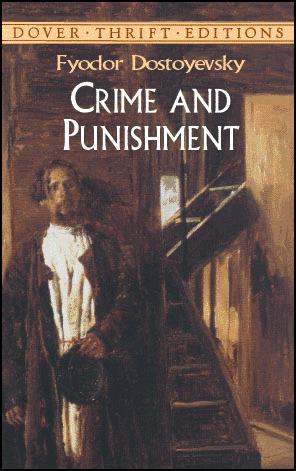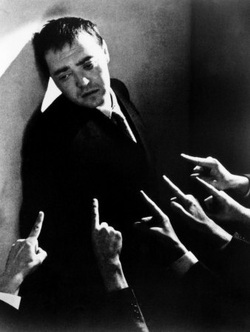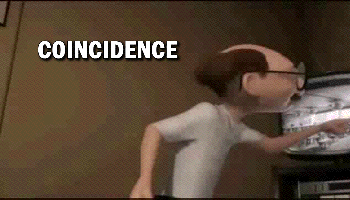So far, (I have reached Part III of the book; the novel is divided into six parts) I have noticed many similarities between Crime and Punishment and a rather unexpected story; the wildly popular Japanese television show, Death Note. The stories bear such striking similarity that I cannot help but wonder if the mangaka (an author of Japanese "comic book" art, known as manga, which is often adapted for television) of Death Note, Tsugumi Ohba, read Dostoevsky's novel and was inspired by it.
I understand that Death Note is not a novel, in fact, one could label the series pop art; it was one of the best selling mangas in Japan, one of the most popular animes/television series there, and was also made into a two-part live-action movie blockbuster. However, these facts do not stop the story from being profoundly intellectual material, and I think it is worthy of analyzation as well as respect.
For those that aren't wild otakus (anime nerds) or simply haven't heard of the series, here's a very basic summary:
Light Yagami is an incredibly brilliant Japanese student who ranks at the top of his class (and racial stereotypes aside, ranking at the top of a class in Japan is no joke). He happens to encounter a Death Note one day on his way home from school, a supernatural notebook that allows the user to kill any person by writing down their name and envisioning their face.
Light, whose father is a police chief, has a strong concept of justice and decides to become the grand juror of the world, executing dangerous criminals and anyone whom he deems unworthy to live in "this rotten world." He aspires to create a new world in which only good and honest people are allowed to survive. However, he is quickly caught in a game of cat-and-mouse with the world famous detective, L, in a battle of wits and moral philosophy. L believes that what Light is doing is inherently evil, and vows to hunt him down.
And now, for those of you who have not read Crime and Punishment:
The protagonist (or perhaps, antagonist) of Dostoevsky's novel is a Russian student, Raskolnikov, who is very bright but also very impoverished. In Russia at the time, the social hierarchy was structured in a such a way that the most respectable people/nobles could often be poor, and the rich were not always the most highly regarded. Raskolnikov thinks very highly of himself, and has a tendency to believe that he is smarter than everyone else around him.
Completely poor and in debt to his landlady, Raskolnikov finally executes an idea he has been toying with for several months; murder. An old pawnbroker woman who lives down the street is notoriously hated; she is "as rich as a Jew" (antisemetic, much?) but very stingy, and beats her kind, but simple sister, Lizaveta. Raskolnikov deems that she is of no use to the world, and her money would be better put to use if spent to 'help the poor' (aka, himself -_-). One day, he overhears a merchant say that Lizaveta will not be home the following day, and carries out the murder, stealing the pawnbroker's money. Lizaveta comes home unexpectedly, however, forcing him to kill her as well.
The "crime" is part I of the novel; the rest of the novel focuses on the "punishment." Raskolnikov seems to have endured two punishments so far; guilt, and paranoia. I expect more punishment to ensue.
So what does a seemingly obscure television show (to Americans, anyway) have in common with Crime and Punishment?
Let's begin with the protagonists.
1. First of all, Light Yagami and Rodion Raskolnikov are both very intelligent, but very prideful and arrogant people. This ultimately leads Light to his downfall, and I believe it will do so for Raskolnikov eventually. They believe that they can do no wrong, believe they were supernaturally willed to action, and as a result, they constantly justify their actions as morally upright even if they are clearly not.

Light deems himself worthy of passing ultimate judgement, stating “I’m going to make the world know I’m here… that somebody is passing righteous judgement on them.” He is very Machiavellian (Machiavelli = Italian dude who write The Prince, the notorious real-world guide on how to rule a state with an iron fist through whatever means necessary) in thought, meaning that he believes the ends justify the means, no matter what. So he justifies murder, an inherently immoral action, by stating that murder will make the world a better place for "good" people.

Light also has a tendency to believe that he has been chosen, perhaps by some divine power, to be the "god of the new world."
He expresses this belief by asking Ryuk, the god of death who dropped the notebook in front of him (Ryuk was verrrry bored) why he was chosen. However, Ryuk laughs at this question and makes Light out to be arrogant, asking, "I didn't choose you. Don't you see this is all just an accident? You actually thought you were chosen because you're so smart or something? Don't be so vain. It just happened to fall around here and you just happen to pick it up, and that's all there is to it. "
 |
| Bored Ryuk |
Raskolnikov similarly justifies his actions, believing that the old woman's death will be good riddance and her money can do a lot of good. If her will is followed, her money will be sent to a monastery when she dies, so that the priests will pray for her in perpetuity, while her sister Lizaveta, who is beyond poor, will get none of it. Therefore, he justifies the very wrong action of murdering her by stating that she is selfish and unworthy, while he is respectable.
He also believes that he has been supernaturally fated to kill the old woman. Dostoevsky states, "Raskolnikov had become superstitious of late...he was always afterwards disposed to see something strange and mysterious, as it were the presence of some peculiar influences and coincidences" (Dostoevsky 56). Raskolnikov views a series of coincidences as proof that he has been somehow destined to kill the old woman. The first coincidence happens in a tavern; Raskolnikov has just come back from the old woman's place, lost in thought.
He concludes that the world would be better without her, and that her money would be better put to use elsewhere, when he overhears a conversation. He hears two men discussing...the old pawnbroker, and how the world would be better without her, and that her money would be better put to use elsewhere.
This strikes him as a strange coincidence. He later takes a random route to a frequent destination of his; he had no reason to take that route, as it is longer and less convenient, but he was not thinking and finds himself there all of a sudden. Then he overhears a merchant telling Lizaveta, the pawnbroker's sister, to come visit him at 7:00 the following day; meaning she won't be home, and the time will be ideal for Raskolnikov to murder the pawnbroker. He would never have known this if he hadn't happened to go that way, which he views as another sign. Later, right before the murder, he realizes he forgot to find an axe to kill the woman with, and panics, but then finds one conveniently lying around, unattended, furthering his belief that the coincidences point to a divine plan.
2. There are more similarities between the two protagonists, the main one being the destruction of their justifications. Even if both of their actions (murder, namely) had been truly justified and their cause 100% worthy, such causes quickly unravel. The road to hell is indeed paved with good intentions.
Light begins to panic when the Japanese Police and L hire the American FBI to come to Japan and investigate the Kira (a butchering of the english world, 'killer' - no one can find the murderer as of yet, so they refer to him as "Kira") case. He especially panics when one of the agents begins to follow him, as the detective L suspects him. He sets up an elaborate plot to kill the agent, Raye Penber, and his fellow FBI agents. Penber is humanized by mangaka Ohba, who shows the agent with his wife, former FBI agent Naomi Misora, a Japanese immigrant. They plan to be married and have children, and Raye has done no crime; he is even in a law-enforcement situation, carrying out justice in his own way. But Light, paranoid, kills Penber on the subway after tricking Penber into killing all the FBI agents, therefore unraveling his justification of murder. He goes on to kill Penber's shrewd wife, Naomi Misora, when she nearly finds him out. Despite all of this, Light refuses to admit guilt, now expanding his justification into "all who stand in Kira's way must be destroyed, because they obstruct justice."

Raskolnikov, on the other hand, runs into some problems during his murder. Lizaveta, the harmless, kind sister of the pawnbroker, walks in during the murder and sees him. Knowing the price if caught, he also hacks into her with an axe. Suddenly all his justifications for killing the pawnbroker dissipate into thin air; he has now killed an innocent woman to cover his own hide, not to enforce "justice."
Similarly to Light, he does not feel repentant for his actions (at first). In fact, he further believes that another coincidence proves he was ordained to commit this murder and get away with it. He almost is caught when two men knock on the door; but he bolts it, and they leave to get the porter. He runs out and there happens to be an empty room, abandoned by the painters, and he hides in there until everyone has passed. The fact that he got away by such a narrow margin confirms his belief that he is justified in committing murder.
 3. Another similarity is the apparent paranoia that grows and grows and grows in these characters as they fear the consequences of their actions. With Raskolnikov, it is blatantly obvious; the language the narrator uses has made me frequently question whether he is sane. Raskolnikov worries himself into fits, and almost turns himself in several times to end the paranoia and the fear he will be caught. He even tries to throw the goods he stole into the river to escape this fear; however, he realizes the goods might surface and his crime be exposed. This is a metaphor for his own punishment; he tries to hide the crime but is paranoid that it might surface any minute.
3. Another similarity is the apparent paranoia that grows and grows and grows in these characters as they fear the consequences of their actions. With Raskolnikov, it is blatantly obvious; the language the narrator uses has made me frequently question whether he is sane. Raskolnikov worries himself into fits, and almost turns himself in several times to end the paranoia and the fear he will be caught. He even tries to throw the goods he stole into the river to escape this fear; however, he realizes the goods might surface and his crime be exposed. This is a metaphor for his own punishment; he tries to hide the crime but is paranoid that it might surface any minute.Light, meanwhile, begins as cheerful and even likable to the audience, whether they believe in his cause or not, but by the end, paranoia causes Light to degrade into a complete maniac. He launches into his monologue about he was the only person on earth who could do something so awful as endless murder in order to create a new world of order; shortly after, he is murdered by a Death Note himself.
(See link: he's lost his mind. http://www.youtube.com/watch?v=DttHTlNaV0s)
Interestingly, Death Note has a fairly normal Japanese opening theme song to start the show every episode, but the last episode, and only the last episode, has a Death Metal song as the opening with images of Light's crazed face, demonstrating that he has gone from a charming, attractive, bright young man with a strong concept of justice to a crazed lunatic who has lost his mind, cursed by his terrible killing power and the fear of being found out.
4. Another similarity is the questionability of their statuses; are they protagonists or antagonists? Or does their position change over time? You find yourself rooting for both Light and Raskolnikov, even though they are both murderers, but parts of both their stories make viewers headdesk - or headwall - with frustration, and perhaps change their opinions of these characters mid-story.
5. A final similarity between the two characters is their strange need to confront their hunters, as if to taunt them.
Light's pride is most definitely his undoing. L taunts Kira on "National TV," and dares Kira to kill him.
Light does so, but the "L" on TV is actually a criminal sentenced to death row that very day, pretending to be L, and therefore Light hasn't killed the real L. L reveals that the broadcast was not international, but in fact only broadcast in Tokyo, Japan. By noting the times of the killings and Light's own interaction with him, L is able to deduce that Kira is a student in Tokyo, narrowing down the pool from the whole world to one city, and eventually down to Light himself. Light insists on working with L and even gets to know him; if Light didn't have a prideful need to play god, to kill those who opposed him, and to confront his opposition, he would never have been found. If he had stuck to his "kill only evil people,"motto - and never added the "all who oppose me are evil!" clause - therefore never bothering to even answer L or try to kill him - he would never have been caught. Supernatural notebooks leave no traces. Hubris is his weakness.

Raskolnikov is similar. He confronts the detective, Zametov, in a bar and tells him how he would have committed the crime if he was the murderer, which is so, so unbelievably stupid. This heightens the police's suspicion about him, in a time and place (19th century St. Petersburg) where he could have simply disappeared and never have been found. Such slip ups, I believe, are going to swiftly land his sorry person in the Gulag out in Siberia.
One key difference between these two, however, is the guilt factor. Light feels no shame or guilt (and almost doesn't seem human at times) whereas Raskolnikov, though he will not admit it, seeks atonement for what he has done and feels terrible about the crime.
So ultimately, Crime and Punishment and Death Note bear some striking similarities, and I'll update in future posts if these similarities continue further. I'm definitely liking summer reading so far, Crime and Punishment is anything but boring, and more importantly, it focuses on the concept of subjective morality as well as the idea of true justice, both of which are among my favorite topics.







I was in the middle of the book when I made the connection, I thought I was the only one who had noticed
ReplyDeleteNice post
ReplyDeleteThanks for sharing
Cheap funeral Huntley IL
Huntley IL funeral home and cremation
Strangely enough, I also made the connection when reaching Part 3 (perhaps it was something to do with the arrival of his mother and sister seeing him in his delirious state, as it brought on a vivid memory of Light's struggle with hiding his murderous act(s) from his own family). I'll have to read this article when at home, as I had only made the quick online search to see if the connection had been recognized before on my break while reading C&P. I'll be very interested to hear your thoughts!
ReplyDeleteI loved reading this and have just finished watching death note. I want something to fill that gap in my heart so I think I will read crime and punishment next.
ReplyDeleteYeah, Light always reminded me of Raskolnikov. It's nice to see i'm not alone.
ReplyDeleteI think Raskolnikov murdered the pawnbroker not just for money, “I was not so hungry.... I certainly did want to help my mother, but... that’s not the real thing either.... Don’t torture me, Sonia.”, said Raskolnikov in his confession to Sonia. It is more likely that he also want to prove his supremacy according to his theory, where all humans are divided into two categories, ordinary and extraordinary. Obviously Raskolnikov's impoverished state does attribute to the motive of assassination, but it is his fantasy about being Napoleon himself, to prove that he is a superman who can kill on behalf of goodness (btw this is also Dostoyevsky mockery towards nihilism and utilitarianism), that leads to the crime
ReplyDeletei and my friend were reading crime and punisment resume for a progect when I realized the incredible resemblance between these two
ReplyDeleteI just finished Crime and Punishment and I though of the same, in fact, googling Light and Raskolnikov is what brought me to this blog. I loved your analysis!
ReplyDelete